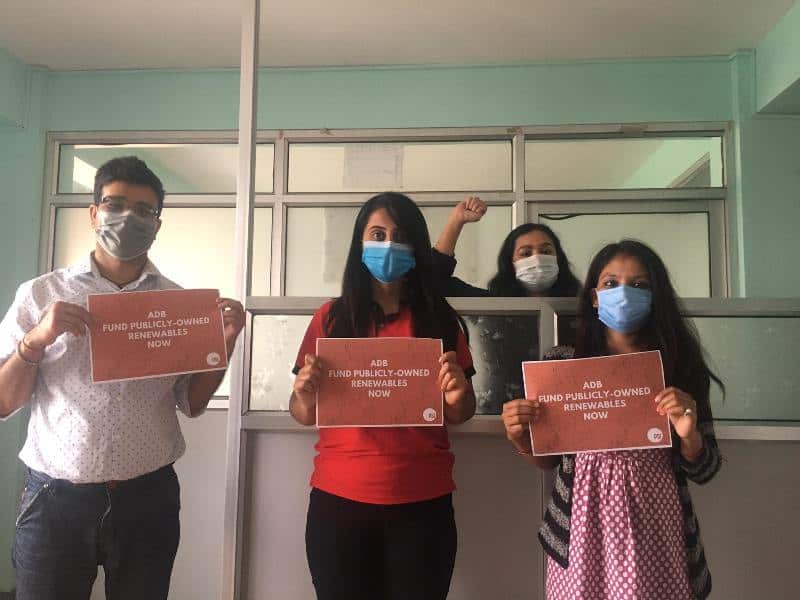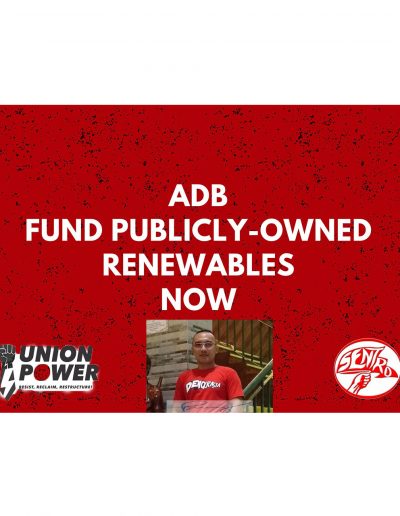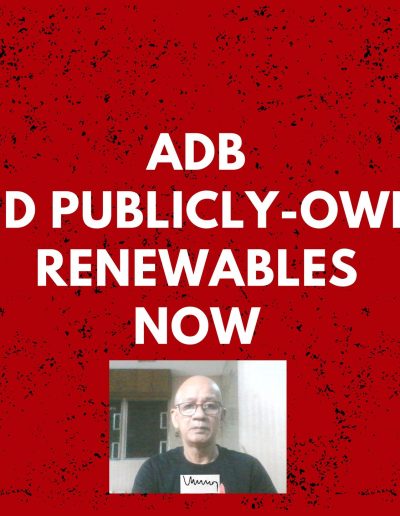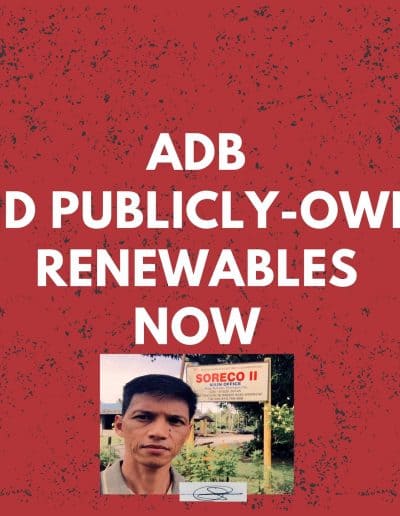Unions send strong message to Asian Development Bank to fund publicly owned renewable energy
Union Aid Abroad – APHEDA’s partner organisations in Nepal and the Philippines call on the Asian Development Bank to stop supporting fossil fuels and to fund publicly-owned renewable energy projects.
Unions take on the ADB’s virtual meeting
On 18 September 2020, the 53rd (virtual) annual meeting of the Asia Development Bank (ADB) was met by a strong call from unions for the Bank to fund publicly-owned renewable energy. Unions from across the Asia-Pacific region made the call as part of a broader people’s movement online protest for the Bank to stop supporting fossil fuels and ensure that its investments are in line with limiting dangerous global warming to 1.5 degree Celsius, as per the ambition of the Paris Climate Change Agreement. The ADB is a key source of funding for developing economies across the region and in 2019, it committed over US$30 billion in funds. However, not only does the Bank continue to fund fossil fuel projects, it also aggressively pursues market liberalisations and privatisation of the electricity sector. Instead, the ADB must change its approach so that reliable grants-based funding is made available for accountable governments to directly invest in new renewable energy such as solar and wind power.
Class Nepal highlights the importance of a public goods approach
APHEDA’s partner organisation Class Nepal took part in the online protest. General Secretary, Parshuram Pudasaini, explains why a public goods approach is so important for workers in Nepal:
The forests, bodies of water, and the biological diversity in our mountains are under threat from climate change. These are key sources of livelihood for working people in our country. When it’s obvious that the sustainability of our livelihoods is the least of the private sector’s priorities, it is when we realise how crucial public investments are to us as workers in union.
In addition to being on the frontlines of dangerous global heating, Nepal is an energy poor nation where 12% of citizens lack an electricity connection and reliability of supply also a key issue. The ADB along with other International Financial Institutions continue to encourage electricity market liberalisation in Nepal.
Janardhan Bhattarai is the Leader of the Nepal Electricity Authority Employees Union and explains why public ownership is so important in the sector:
The private electricity sector has failed to guarantee workers’ rights, even as they make massive profits from polluting the earth. We call for a just transition to renewable energy: by guaranteeing decent work to workers who are free to exercise trade union rights, the public could be assured of quality public services, while protecting the people’s and the earth’s health.

Fighting for publicly-owned renewable energy in the Philippines
In the Philippines, APHEDA’s partner organisation SENTRO and its POWER Federation also took part. The Philippines was one of the early adopters of liberalisation and privatisation in the electricity sector. Electricity in the Philippines is increasingly unaffordable for households, with one of the highest prices in Asia, and with the percentage of fossil fuels increasing in the overall energy mix. POWER is fighting to retain social ownership across the country’s 121 electric cooperatives and enhance their business model through switching to micro-hydro, solar and wind energy.
Jun Unay, General Secretary of POWER, explains why finance for public-owned renewable systems is fundamental:
For POWER-Sentro, publicly-owned renewable energy is important. Why? Because the motive is service, not profit.It must be affordable and accessible for low income communities.
APHEDA looks forward to continuing to support its partner organisations to engage International Financial Institutions and other targets to ensure the transition to renewable energy is a public good for all.
The Global Justice Organisation of the Australian Union Movement
The work of Union Aid Abroad – APHEDA relies on the efforts of thousands of Australian unionists and internationalists who raise funds, volunteer, and take action to build solidarity across borders.


